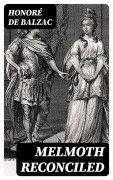Honoré de Balzac: Letters to Madame Hanska, born Countess Rzewuska, afterwards Madame Honoré de Balzac, 1833-1846

| Produkttyp: | eBook-Download |
|---|---|
| Verlag: | DigiCat |
| Erschienen: | |
| Sprache: | Englisch |
| Seiten: | 615 (Druckfassung) |
| Format: | EPUB
Info▼
|
| Download: | 965 kB |
Honoré de Balzac's 'Letters to Madame Hanska, born Countess Rzewuska, afterwards Madame Honoré de Balzac, 1833-1846' presents an intimate glimpse into the private life of one of the 19th century's towering literary figures. These letters, elegantly reproduced by DigiCat Publishing, offer not only a chronicle of a profound emotional journey shared between Balzac and his eventual wife, Ewelina Hańska, but also a mirror reflecting the broader socio-cultural milieu of the time. Balzac's literary style here is both personal and earnest, peppered with the passionate articulateness that characterizes his novels. These correspondences offer invaluable insights into Balzac's thoughts on contemporary events, the creation of his novels, and his philosophical contemplations, thereby enfolding readers in a literary and historical tapestry wrought with the inimitable threads of Balzac's prose.
The epistolary odyssey encompasses the pinnacle years of Balzac's career, revealing the extent to which his real-life muse, Madame Hanska, influenced his literary production. Balzac, a foundational pillar of the realist novel, was a keen observer of human nature and the social order. The correspondences collected in this tome shed light on the personal motivations and experiences that seeped into his vast body of work, illuminating the confluence of real-life inspiration with a creative genius that defined an era in French literature.
This collection stands as an invaluable resource for both scholars and admirers of Balzac's work. The comprehensive anthology of his sentiments, rendered with the acute emotional depth and intellectual rigor characteristic of his literary voice, merits the appreciation of those who seek to understand the man behind the monumental La Comédie Humaine. Engaging with these letters facilitates a deeper comprehension of the intricacies of human relationships and the profound impact they can have on the artistic endeavor. Readers are thus strongly encouraged to delve into this meticulous compilation to enrich their perspective on both Balzac's individual creativity and the broader contours of 19th-century literature.











